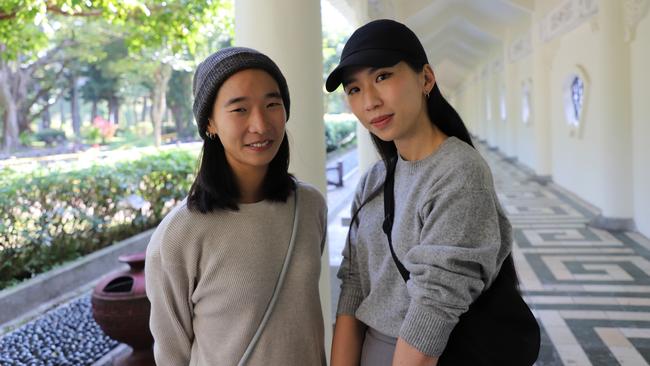Voters fly in as Taiwanese poll goes down to the wire
Taiwan does not allow postal votes, so every four years thousands fly home to participate in the only Chinese-speaking democracy in the world.

Cloud Chen has just flown 16 hours from The Netherlands to Taipei to vote in Taiwan’s presidential election.
Taiwan does not allow postal votes, so every four years thousands of Taiwanese like her fly to their homeland to participate in the only Chinese-speaking democracy in the world.
“I feel it’s the bare minimum I can do,” Chen, 33, tells The Weekend Australian in a park in Taipei.
The user-experience designer, who lives in the Dutch city of Zwolle, says the stakes are existential. She thinks it would be catastrophic if China’s preferred partner in Taiwan, the Kuomintang (KMT), wins next Saturday’s election. “I think this country will be over,” she says.
Her younger sister Raven, 28, agrees. They both are going to vote for William Lai, the presidential candidate for the pro-independence Democratic Progressive Party (DPP). Dr Lai, the vice-president, is the narrow favourite in a three-way race that experts in Taiwanese politics say is too close to call.
The former medic calls the election a choice between “democracy and autocracy”. His pledge to continue the approach of President Tsai Ing-wen resonates with DPP supporters, who are deeply distrustful of the KMT.
But it infuriates Beijing, which has cut all communication with Tsai’s DPP government since she was elected in 2016. In a New Year’s Eve address, Chinese President Xi Jinping pledged that Taiwan’s unification with China is “a historical inevitability”.
Many are worried about what Beijing is planning.
Surveys show almost half of Taiwanese voters fear war could break out during the next five years.
The KMT’s presidential candidate Hou You-yi calls the election a choice between “war or peace” – a blunt message that Beijing has also amplified.
Chou Li-Fang, 64, has flown to Taipei from her home in California to do her bit to help the KMT.
She thinks the DPP’s China policy is dangerous. “You don’t have to be so troublesome with China. We are all Chinese. Then we don’t have to spend so much money buying useless weapons.”
The third force in the presidential campaign is the former Taipei mayor Ko Wen-je, who has shaken up Taiwan’s two-party system with a pitch to practice a “new politics”. Ko, a former surgeon, has Cheng Bo-chen’s vote.
“I want peace,” Cheng, 62, says when asked what made up his mind.
The retired public servant thinks Ko will be able to talk to Beijing while not compromising Taiwan’s democracy.
Taiwan went into a polling blackout, required by law, at midnight on Tuesday. The final polls found Lai in front by between 2 two and five percentage points, with Hou in striking distance behind and Ko in third place.
Seasoned observers still think there is a path for a KMT win. But if Lai wins, the most likely result, there is a unanimous consensus that Beijing will respond angrily. “It will only be a question of when and how large,” says one senior diplomat.
That post-election drama doesn’t seem to faze DPP supporters, such as Xia Ning-wei, 70.
He is in a good mood on Friday morning. He has just been looking into the future with the aid of a set of Chinese fortune-telling sticks.
“I asked who will win the presidency,” he says smiling. “It will be William Lai.”
Inquirer: Threat of ‘war or peace’ as Taiwan prepares to vote
INQUIRER P21




To join the conversation, please log in. Don't have an account? Register
Join the conversation, you are commenting as Logout